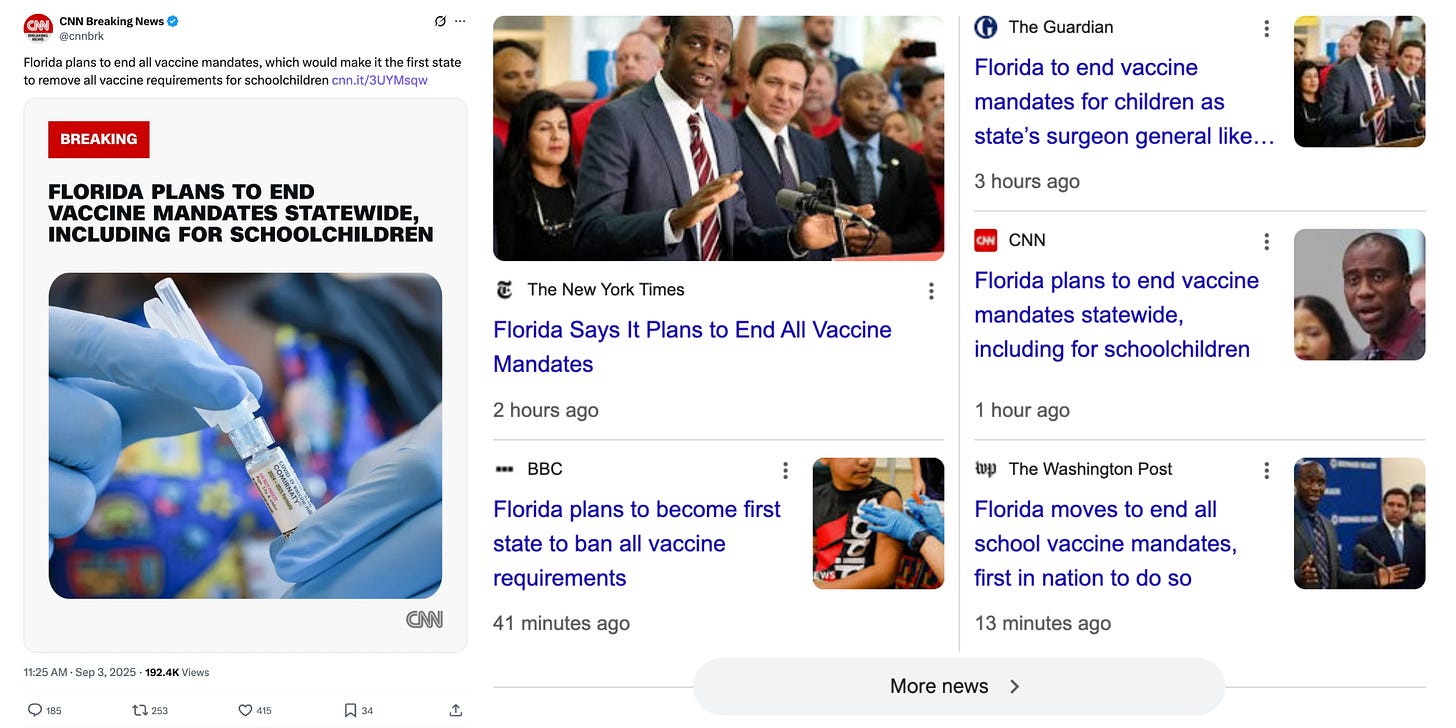A/B Testing the Future: What Florida’s Vaccine Mandate Reversal Can Teach Us About Federalism and Policy
A reminder that the United States was designed as an experiment in federated variation
September 4th, 2025 —
Yesterday, Florida officials announced plans to end vaccine mandates across the state, including for school-aged children. The proposal, still moving through the legislative process, would mark a significant shift from decades of precedent that required children to receive routine immunizations—such as those for measles, mumps, and polio—in order to attend public school.
Regardless of where you fall politically, this kind of move can feel like a cultural earthquake. It touches public health, parental rights, science, trust in government, and the role of the state. It raises hard questions: Are we abandoning common sense? Or are we finally restoring autonomy?
Whether this announcement excites or enrages you likely depends on your prior assumptions. But this piece isn’t about arguing one way or the other. It’s about something deeper because beyond the emotional reactions lies a more systemic (and arguably more important) question:
What if we viewed decisions like this not as ideological battlegrounds, but as real-world A/B tests?
And not just any test, but one that—if we’re paying attention—could reveal something essential about how a country of 330 million people learns, adapts, and evolves.
What if we treated America less like a monolith and more like what it actually is—a giant experiment in federated variation?
We often think of laws as static things—rules made and enforced at the highest level. But in the United States, states retain an enormous amount of power. And that power isn’t just bureaucratic; it’s philosophical. It’s the idea that one size does not fit all, and that sometimes, the best way to find truth is through contrast.
That’s what federalism was designed for. Not just to decentralize power, but to decentralize experimentation. When Florida reverses a mandate, California doesn’t have to. When Oregon decriminalizes drugs, Texas doesn’t to. Each state becomes a kind of real-world “control group” for others to observe. These aren’t failures of national unity—they’re experiments.
Because in a country this large, made up of people across wildly different geographies, cultures, and risk profiles, uniformity is often the enemy of insight.
This is not just a quirk of American politics—it’s a structural feature. A built-in A/B testing framework for public policy.
what is an A/B test, really?
In the tech world, A/B testing is a simple but powerful concept. For example, you show two different groups two different versions of a product, webpage, or interface—Version A and Version B—and see which performs better. One group gets a blue button. The other gets a red one. You track the results, you look at the data and you iterate accordingly from what you learn.
The goal isn’t to prove who was right. It’s about measuring results in the wild to find out what’s true.
A/B testing comes from the scientific method: form a hypothesis, isolate variables, gather evidence, iterate. But it became core to modern software culture because it gave companies real-time, user-based feedback—not just opinions in a boardroom. It exploded in popularity with the rise of digital platforms and is now the default mindset at companies like Google, Amazon, and Meta—where changes aren’t rolled out all at once, but tested in controlled conditions with real users.
Good A/B tests don’t start with the desire to prove someone right. They start with the desire to learn what works.
What if we thought of public policy the same way?
What if, instead of framing every difference in law or governance as a threat to “our values,” we saw it as a controlled experiment? One that lets us observe, refine, and improve across time?
Before I go any further, I want to be very clear: I don’t think ending school vaccine mandates is just a minor tweak. It’s a dramatic move that breaks from decades of precedent. Public health experts will argue that we’ve forgotten the lessons of the 20th century—how widespread vaccination led to the eradication of deadly diseases. Others will say we’ve drifted too far toward coercion, and that voluntary health decisions should not be prerequisites for public participation.
Whatever your view, this moment becomes a live experiment with real-world outcomes.
If removing vaccine mandates for schoolchildren leads to worse public health outcomes—higher hospitalization rates, more outbreaks, long-term complications—then Florida will be the cautionary tale.
If it leads to similar or better outcomes—more trust in institutions, less resistance to optional vaccines, higher parent satisfaction—then maybe the current mainstream strategy needs recalibrating.
We won’t know for a while, but in the meantime, the rest of the country gets to watch and learn. Keeping in mind that the point of an A/B test is not to moralize, but to gather data.
we’ve done this before (many times, actually)—
If this sounds novel, don’t worry—it isn’t. America has always evolved through policy experiments—some disastrous, some transformative.
Same-sex marriage started as a state-by-state experiment. Before it was legalized nationwide in 2015, several states had already adopted it. The predicted societal collapse never came. The test ran, the data emerged, and public opinion shifted.
Prohibition was once a constitutional amendment. Its failure wasn’t theoretical—it was lived. The black market thrived. Crime surged. The experiment ended. And the lesson stuck.
Charter schools, drug decriminalization, Medicaid expansion, universal basic income pilots—all of these are forms of A/B testing at the state level.
Each one represents a hypothesis (moral, social, economic) and a willingness to try something different in one environment and see what happens—while others take notes.
Of course this isn’t foolproof, and not all A/B tests are well-structured or ethically sound.
Sometimes there’s no clear success metric. Sometimes the timeline is too short. Sometimes you’re testing at the expense of people who didn’t consent, or the political rhetoric drowns out the actual data. And not every state-level decision should be lauded as bold experimentation. Some are rushed. Some are ideologically driven. Some put vulnerable populations at risk.
But dismissing the existence of experimentation because it’s messy is like rejecting science because early medicine used leeches. And the alternative—total uniformity—isn’t exactly safe either. When every system is centralized, every mistake becomes national. Every failure affects everyone. There’s no sandbox. No fallback. No comparison point. Without divergence, we lose our ability to course-correct.
A/B testing isn’t always clean, but it’s often the least bad way to learn at scale.
Uniformity might feel safer, but it produces stagnation. Variation reveals edge cases. Outliers teach us things averages never can.
The takeaway here isn’t whether we agree or disagree with Florida’s decision—although that matters. But whether we’re willing to observe without immediately condemning. To collect evidence before forming unshakable conclusions. To remember that public policy, like product design, gets better when we stop trying to get it perfect on the first try—and start running better tests. It’s recognizing that we live inside a giant, multi-variable experiment—and we should want it that way.
This is not a call for passivity. It’s a call for patience. For discernment. For civic curiosity. Because like it or not, we are all part of a national A/B test—every single day.
The question isn’t just what Florida will do. It’s what the rest of us will learn from watching.
How do you think this test will shake out? Let me know in the comments.
XO, STEPF







I'm interested to see how this pans out. For every paper that swears vaccines work, there are equally compelling (and more importantly, independently funded) papers and research showing the opposite. Sounds like Florida is taking the plunge to be a litmus test for this discussion.
And you're absolutely right that government is an experiment, on several levels. Having a decentralized, federalist government allows for flexibility to ensure best practices for every area. Compare this to a country like Russia, where what works for the major cities doesn't fit with the more extreme rural areas - but they still must conform.
I like what Thomas Jefferson supposedly said, "The state governments are the true laboratories of democracy; each state, in its sovereignty, can experiment with new ideas, and the successes of one may be adopted by others, advancing the common good."
There is and should be a balance between states and the federal government. In this case, if an individual or family decries Florida's new laws, they can move out. That's part of the A/B test results...